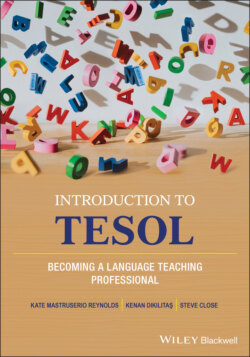Читать книгу Introduction to TESOL - Kate Reynolds - Страница 30
Administration
ОглавлениеThe need to understand and be able to work with the unique backgrounds, skill sets, and needs of ELLs is great, so leadership roles are available to TESOL professionals. Often, TESOL educators have grown into leadership roles in public schools over time, serving as instructional coaches, team leaders, or district-level program administrators. As team leaders and instructional coaches, these individuals collaborate with other teachers to ensure high-quality academic instruction for ELLs while providing support for general educators in how to work with ELLs and their families. They may provide leadership for other TESOL educators in new developments in research and practices or offer district-level workshops and professional development opportunities for TESOL and/or general educators. District-level administrators often have instructional mentoring and guidance responsibilities, but they also interpret regional or state-level policy and mandates, evaluate and choose curricula, proctor standardized tests, and report student academic and/or language achievement on reports to national educational bureaus or ministries.
Another avenue in administration open to TESOL professionals is intensive English program (IEP) administration in universities. In second language contexts, IEPs offer courses to international exchange students studying for degrees or study abroad. These individuals organize all parts of the language program offered to ELLs including organizing curriculum at differing levels, ensuring consistent and quality instructional delivery, proctoring pre- and post-course/program assessment, ordering books and materials, arranging cultural excursions, handling all issues associated with student visas, arranging housing, marketing their program, and recruiting students.
Some TESOL professionals move into governmental roles. These professionals may work in national-level offices, bureaus, or ministries of education or state to organize international scholar exchange, oversee grant programs for teacher preparation or student exchange, research educational achievement of ELLs, develop laws, policy and guidelines around the teaching and learning of English, develop curriculum, and engage in soft diplomacy through the sharing of culture. For example, a TESOL educator might find opportunities in ministries of education in China or Japan to write curricula, textbooks, or standards.
